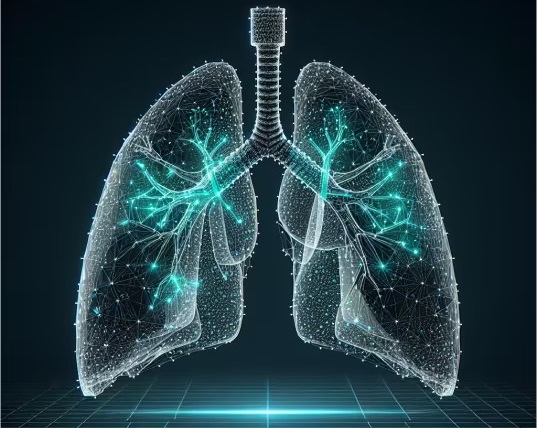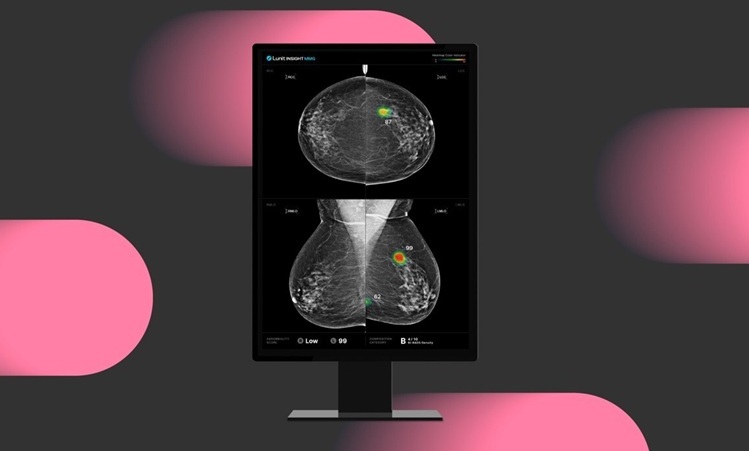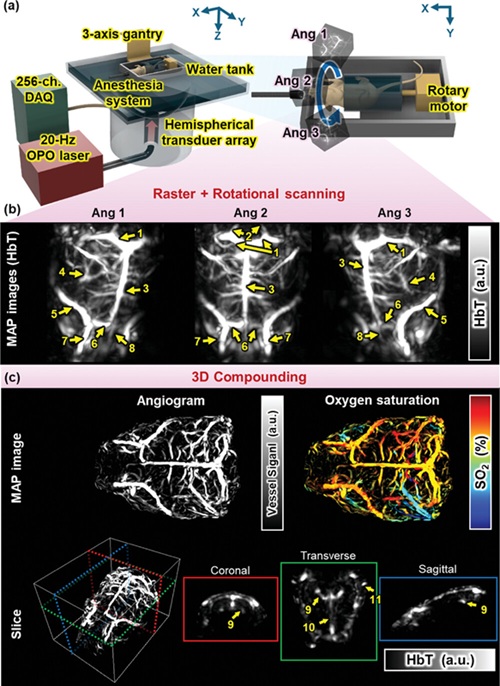AI Powered Portable Lung Imaging Brings Life-Saving Diagnostic Capabilities to POC
|
By MedImaging International staff writers Posted on 11 Sep 2024 |

In situations where nurses are at the bedside with a deteriorating patient in busy hospitals, delays in obtaining diagnostic tests can result in late treatment for potentially life-threatening respiratory issues. If nurses were trained to use point-of-care ultrasound, they could access real-time data that would significantly shorten the time to diagnosis and appropriate treatment. Now, artificial intelligence (AI) could transform the way nurses evaluate lungs in hospitals and healthcare settings globally.
Deep Breathe (London, ON, Canada) offers lung ultrasound technology that healthcare providers can use at the bedside to diagnose various lung conditions. By incorporating AI, algorithms can more effectively analyze and interpret ultrasound images. Deep Breathe combines AI with traditional ultrasound technology to streamline image interpretation and automate the diagnostic process. This technology is intended to replace slower, less efficient methods and reduce the risks associated with radiation-based X-rays. By integrating AI with bedside ultrasound, nurses could reliably rule out pneumothorax and evaluate other serious lung conditions. Furthermore, by integrating AI into lung ultrasound technology, nurses could quickly detect B-lines, a key indicator of fluid in the lungs. If no B-lines are present, the team could confidently administer IV fluids to treat the patient’s low blood pressure.
Several healthcare institutions have already recognized the benefits of nurse-led point-of-care ultrasound and have begun incorporating it into nursing practice. A prospective observational study conducted in a mixed medical and surgical ICU evaluated the effectiveness of nurse-led thoracic ultrasound. The study revealed that 27% of the ultrasounds led to changes in patient management, with most changes (56%) falling within the nursing scope of practice. Deep Breathe aims to expedite this shift toward nurse-led lung ultrasound by using deep learning algorithms to enhance and automate the interpretation of portable lung ultrasound images, providing a faster and more accurate alternative to traditional methods.
"Our AI-driven ultrasound solutions are designed to bring life-saving diagnostic capabilities to the point of care, even in the most challenging environments,” said Dr. Rob Arntfield, CEO and Founder of Deep Breathe.
Related Links:
Deep Breathe
Latest Ultrasound News
- Tiny Magnetic Robot Takes 3D Scans from Deep Within Body
- High Resolution Ultrasound Speeds Up Prostate Cancer Diagnosis
- World's First Wireless, Handheld, Whole-Body Ultrasound with Single PZT Transducer Makes Imaging More Accessible
- Artificial Intelligence Detects Undiagnosed Liver Disease from Echocardiograms
- Ultrasound Imaging Non-Invasively Tracks Tumor Response to Radiation and Immunotherapy
- AI Improves Detection of Congenital Heart Defects on Routine Prenatal Ultrasounds
- AI Diagnoses Lung Diseases from Ultrasound Videos with 96.57% Accuracy
- New Contrast Agent for Ultrasound Imaging Ensures Affordable and Safer Medical Diagnostics
- Ultrasound-Directed Microbubbles Boost Immune Response Against Tumors
- POC Ultrasound Enhances Early Pregnancy Care and Cuts Emergency Visits
- AI-Based Models Outperform Human Experts at Identifying Ovarian Cancer in Ultrasound Images
- Automated Breast Ultrasound Provides Alternative to Mammography in Low-Resource Settings
- Transparent Ultrasound Transducer for Photoacoustic and Ultrasound Endoscopy to Improve Diagnostic Accuracy
- Wearable Ultrasound Patch Enables Continuous Blood Pressure Monitoring
- AI Image-Recognition Program Reads Echocardiograms Faster, Cuts Results Wait Time
- Ultrasound Device Non-Invasively Improves Blood Circulation in Lower Limbs
Channels
Radiography
view channel
Higher Chest X-Ray Usage Catches Lung Cancer Earlier and Improves Survival
Lung cancer continues to be the leading cause of cancer-related deaths worldwide. While advanced technologies like CT scanners play a crucial role in detecting lung cancer, more accessible and affordable... Read more
AI-Powered Mammograms Predict Cardiovascular Risk
The U.S. Centers for Disease Control and Prevention recommends that women in middle age and older undergo a mammogram, which is an X-ray of the breast, every one or two years to screen for breast cancer.... Read moreMRI
view channel
Ultra-Powerful MRI Scans Enable Life-Changing Surgery in Treatment-Resistant Epileptic Patients
Approximately 360,000 individuals in the UK suffer from focal epilepsy, a condition in which seizures spread from one part of the brain. Around a third of these patients experience persistent seizures... Read more
AI-Powered MRI Technology Improves Parkinson’s Diagnoses
Current research shows that the accuracy of diagnosing Parkinson’s disease typically ranges from 55% to 78% within the first five years of assessment. This is partly due to the similarities shared by Parkinson’s... Read more
Biparametric MRI Combined with AI Enhances Detection of Clinically Significant Prostate Cancer
Artificial intelligence (AI) technologies are transforming the way medical images are analyzed, offering unprecedented capabilities in quantitatively extracting features that go beyond traditional visual... Read more
First-Of-Its-Kind AI-Driven Brain Imaging Platform to Better Guide Stroke Treatment Options
Each year, approximately 800,000 people in the U.S. experience strokes, with marginalized and minoritized groups being disproportionately affected. Strokes vary in terms of size and location within the... Read moreNuclear Medicine
view channel
Novel Radiotracer Identifies Biomarker for Triple-Negative Breast Cancer
Triple-negative breast cancer (TNBC), which represents 15-20% of all breast cancer cases, is one of the most aggressive subtypes, with a five-year survival rate of about 40%. Due to its significant heterogeneity... Read more
Innovative PET Imaging Technique to Help Diagnose Neurodegeneration
Neurodegenerative diseases, such as amyotrophic lateral sclerosis (ALS) and Alzheimer’s disease, are often diagnosed only after physical symptoms appear, by which time treatment may no longer be effective.... Read moreGeneral/Advanced Imaging
view channel
AI Model Significantly Enhances Low-Dose CT Capabilities
Lung cancer remains one of the most challenging diseases, making early diagnosis vital for effective treatment. Fortunately, advancements in artificial intelligence (AI) are revolutionizing lung cancer... Read more
Ultra-Low Dose CT Aids Pneumonia Diagnosis in Immunocompromised Patients
Lung infections can be life-threatening for patients with weakened immune systems, making timely diagnosis crucial. While CT scans are considered the gold standard for detecting pneumonia, repeated scans... Read moreImaging IT
view channel
New Google Cloud Medical Imaging Suite Makes Imaging Healthcare Data More Accessible
Medical imaging is a critical tool used to diagnose patients, and there are billions of medical images scanned globally each year. Imaging data accounts for about 90% of all healthcare data1 and, until... Read more
Global AI in Medical Diagnostics Market to Be Driven by Demand for Image Recognition in Radiology
The global artificial intelligence (AI) in medical diagnostics market is expanding with early disease detection being one of its key applications and image recognition becoming a compelling consumer proposition... Read moreIndustry News
view channel
GE HealthCare and NVIDIA Collaboration to Reimagine Diagnostic Imaging
GE HealthCare (Chicago, IL, USA) has entered into a collaboration with NVIDIA (Santa Clara, CA, USA), expanding the existing relationship between the two companies to focus on pioneering innovation in... Read more
Patient-Specific 3D-Printed Phantoms Transform CT Imaging
New research has highlighted how anatomically precise, patient-specific 3D-printed phantoms are proving to be scalable, cost-effective, and efficient tools in the development of new CT scan algorithms... Read more
Siemens and Sectra Collaborate on Enhancing Radiology Workflows
Siemens Healthineers (Forchheim, Germany) and Sectra (Linköping, Sweden) have entered into a collaboration aimed at enhancing radiologists' diagnostic capabilities and, in turn, improving patient care... Read more














![Image: [18F]3F4AP in a human subject after mild incomplete spinal cord injury (Photo courtesy of The Journal of Nuclear Medicine, DOI:10.2967/jnumed.124.268242) Image: [18F]3F4AP in a human subject after mild incomplete spinal cord injury (Photo courtesy of The Journal of Nuclear Medicine, DOI:10.2967/jnumed.124.268242)](https://globetechcdn.com/mobile_medicalimaging/images/stories/articles/article_images/2025-02-24/Brugarolas_F8.large.jpg)



